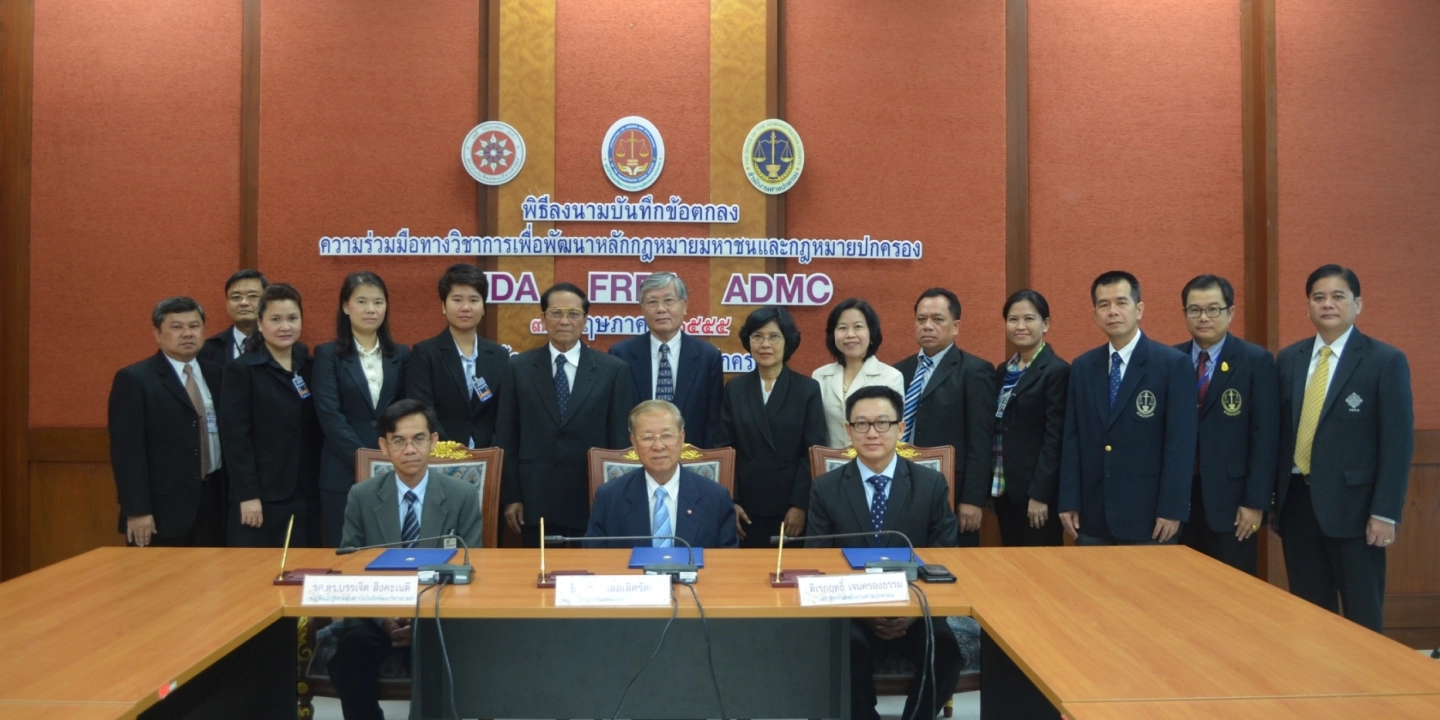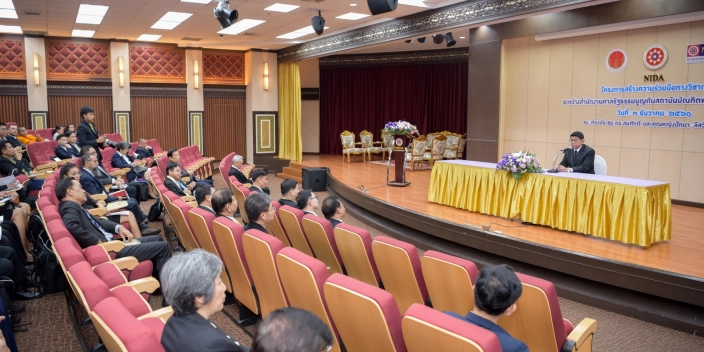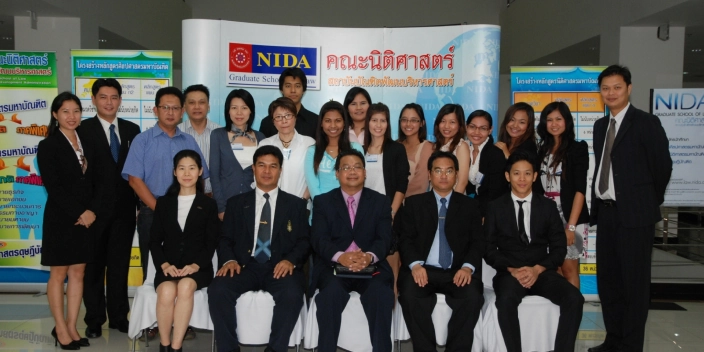Background

The National Institute of Development Administration (NIDA) was established following His Majesty King Bhumibol Adulyadej’s grace and profound vision of enhancing Thailand’s knowledge creation in development administration through the establishment of an advanced educational institution to produce graduates to become agents of change for national development. In order for NIDA to offer all academic disciplines necessary for the dynamic needs of the society, Professor Boonchana Autthakorn, the first NIDA President, stated, “To complete the Development Administration discipline, the Laws should be also included”.


The Graduate School of Law was then established on December 3, 2009 (B.E. 2552) by the support of Professor Dr. Sombat Thamrongthanyawong, the NIDA President at that time, who appointed Professor. Dr. Banjerd Singkaneti as the first Dean of the School.
The Graduate School of Law has a strong determination to strive for academic excellence in law for the development of a just society. In doing so, it provides legal knowledge and produces legal personnel with conscious mind and social responsibility who have expertise, morality, ethics, and integrity toward themselves and the people. In addition to legal education, the Graduate School of Law established "the Law Center for Development" on May 14, 2013 in response to the mission of providing academic services and social responsibility in the form of a legal clinic. Its services include free legal knowledge and advice to the general public, both in-house and on-the-go in various community-based locations. This is regarded as the proactive mission of the Graduate School of Law in serving the society. On top of that, such mission helps developing the students’ knowledge, morality, and ethics necessary for becoming socially responsible lawyers/legal professionals.






โดยที่สถาบันบัณฑิตพัฒนบริหารศาสตร์ได้ประกาศค่านิยมหลัก “WISE” หมายถึง Wisdom (ปัญญา) Integrity (ความซื่อตรง) Sustainable Impact (การสร้างผลกระทบที่ยั่งยืน) และ Empathy (ความเข้าอกเข้าใจ) โดยสภาสถาบันบัณฑิตพัฒนบริหารศาสตร์รับทราบ ในคราวประชุมครั้งที่ 2/2567 เมื่อวันที่ 21 กุมภาพันธ์ 2567 ประกอบกับวาระที่คณะนิติศาสตร์ครบรอบการสถาปนา 15 ปี
คณะนิติศาสตร์จึงเห็นควรให้มีการพัฒนาแนวทางการดำเนินงานให้สอดคล้องกับทิศทางของสถาบัน โดยจัดให้มีการรับฟังข้อมูลจากผู้มีส่วนได้ส่วนเสียของคณะนิติศาสตร์ ทั้งนักศึกษาเก่า นักศึกษาปัจจุบัน บุคลากรสายวิชาการและสายสนับสนุนวิชาการ เพื่อร่วมกันทบทวนพันธกิจ วิสัยทัศน์ ค่านิยมเพื่อมุ่งสู่การพัฒนาอย่างยั่งยืน และประกาศปรัชญา วิสัยทัศน์ พันธกิจ ยุทธศาสตร์ ค่านิยมร่วม และเป้าหมายของ คณะนิติศาสตร์ ดังต่อไปนี้
Philosophy Vision and Missions
Vision
“เป็นสถาบันผลิตบัณฑิตทางกฎหมายชั้นสูง เพื่อการพัฒนาสังคมอย่างเป็นธรรมและยั่งยืน”
Philosophy
“นิติพัฒน์ : นิติศาสตร์เพื่อการพัฒนาที่เป็นธรรมและยั่งยืน”
Missions
- สร้างบัณฑิตทางกฎหมายที่มีความรู้ ทักษะ และภาวะผู้นำเพื่อการพัฒนาประเทศ
- เป็นสำนักคิดทางนิติศาสตร์เพื่อการพัฒนา (School of Legal thought for Development) ระดับประเทศ
- ส่งเสริมและพัฒนาองค์ความรู้ทางกฎหมายเพื่อการเรียนรู้ตลอดชีวิต
- สร้างนิติสำนึก และนิติทัศนะ ในการเป็นนักกฎหมาย ที่มีคุณธรรมจริยธรรม และความรับผิดชอบต่อสังคมและสิ่งแวดล้อม
- ขับเคลื่อนองค์กรด้วยการบริหารจัดการตามหลักนิติธรรมและธรรมาภิบาล
ยุทธศาสตร์
| ยุทธศาสตร์ที่ 1 | สร้างรากฐานและขับเคลื่อนองค์ความรู้ด้านนิติศาสตร์เพื่อการพัฒนาให้เกิดความเป็นธรรมทางสังคม (Social Justice) |
| ยุทธศาสตร์ที่ 2 | เป็นผู้นำด้านการเรียนการสอน การวิจัย และการบริการวิชาการ ด้านนิติศาสตร์เพื่อการพัฒนา |
| ยุทธศาสตร์ที่ 3 | พัฒนาหลักสูตรด้านกฎหมายเพื่อการพัฒนาและสร้างเสริมทักษะของนักกฎหมายเพื่อการนำสังคมอย่างเป็นธรรมและยั่งยืน |
| ยุทธศาสตร์ที่ 4 | ออกแบบ “นิติวิทยาการเรียนรู้” (Legal Pedagogy) ให้สามารถนำองค์ความรู้ทางกฎหมายไปใช้ในการปฏิบัติได้อย่างมีประสิทธิภาพ |
| ยุทธศาสตร์ที่ 5 | ถ่ายทอดองค์ความรู้และประสบการณ์ด้านกฎหมาย เพื่อสร้างนักวิชาการ นักวิชาชีพ และนักบริหาร ที่มีทักษะการเรียนรู้ตลอดชีวิต (Lifelong Learning) |
| ยุทธศาสตร์ที่ 6 | ปลูกฝังบัณฑิตให้มีจิตสำนึกทางกฎหมาย ในการนำองค์ความรู้ไปใช้พัฒนาตนและสังคมอย่างมีคุณธรรม จริยธรรม และจรรยาบรรณ |
| ยุทธศาสตร์ที่ 7 | นำระบบการบริหารจัดการองค์กรด้วยความถูกต้อง เป็นธรรม โปร่งใส ตรวจสอบได้ และมีส่วนร่วมของผู้มีส่วนได้ส่วนเสีย เพื่อให้เกิดการบริหารงานที่มีประสิทธิผลและประสิทธิภาพ |
ค่านิยมร่วม
GSL+ โดยย่อมาจาก
| G | = | Glocalization and Governance |
| S | = | Social Justice and Sustainability |
| L | = | Legality and Leadership |
เป้าหมาย
NITIPATs โดยย่อมาจาก
| N | = | Network | เครือข่าย | |
| I | = | Innovation and Impact | นวัตกรรม | |
| T | = | Trust | ความเชื่อมั่น | |
| I | = | Integrity | ความซื่อสัตย์ | |
| P | = | Professionalism | มืออาชีพ | |
| A | = | Accountability | ความรับผิดชอบ | เป้าหมาย SDG ที่ 16 (16.6) |
| T | = | Teamwork | การทำงานเป็นทีม | |
| S | = | Social Impacts | ผลกระทบต่อสังคม |

